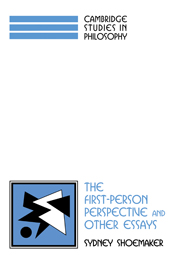Book contents
- Frontmatter
- Contents
- Preface
- Sources
- PART I SELF-KNOWLEDGE
- 1 Introspection and the self
- 2 On knowing one's own mind
- 3 First-person access
- 4 Moore's paradox and self-knowledge
- PART II QUALIA
- PART III MENTAL UNITY AND THE NATURE OF MIND
- PART IV THE ROYCE LECTURES: SELF-KNOWLEDGE AND “INNER SENSE”
- References
- Index
4 - Moore's paradox and self-knowledge
Published online by Cambridge University Press: 16 January 2010
- Frontmatter
- Contents
- Preface
- Sources
- PART I SELF-KNOWLEDGE
- 1 Introspection and the self
- 2 On knowing one's own mind
- 3 First-person access
- 4 Moore's paradox and self-knowledge
- PART II QUALIA
- PART III MENTAL UNITY AND THE NATURE OF MIND
- PART IV THE ROYCE LECTURES: SELF-KNOWLEDGE AND “INNER SENSE”
- References
- Index
Summary
Moore's paradox is usually presented by pointing to the puzzling character of certain sentences, or of imagined utterances or assertions involving these sentences. Conjunctive sentences such as Max Black's “Oysters are edible, but I don't believe that they are,” or the more usual “It is raining but I don't believe that it is raining,” I will call “Moore-paradoxical sentences.” These are seen as having a logically anomalous character because their assertive utterance would involve some kind of logical impropriety, despite the fact that both of their conjuncts could be true. And I think it is widely assumed that both the paradox and its resolution have to do with the linguistic expression of belief.
A natural first move to make in explaining it is to say that while what someone actually says in uttering a Moore-paradoxical sentence is not self-contradictory, since both conjuncts could be true, there is nevertheless a contradiction between what the speaker in some way implies in asserting the first conjunct, namely that she believes the thing asserted, and what she explicitly says in asserting the second, namely that she does not believe that thing. This is also put by saying that there is a contradiction between something expressed by the first conjunct and what is asserted by the second.
If “expressing” a belief requires actually having it, then saying “It is raining” does not always express the belief that it is raining – not all assertion is sincere.
- Type
- Chapter
- Information
- The First-Person Perspective and Other Essays , pp. 74 - 94Publisher: Cambridge University PressPrint publication year: 1996
- 12
- Cited by



